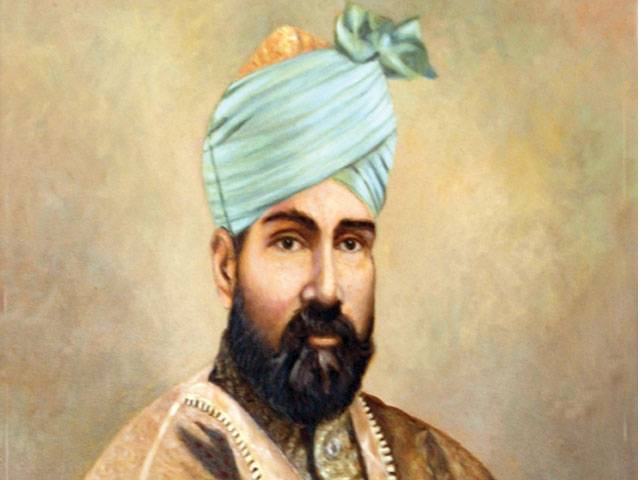By Raja Asad Ali Khan
Maulana Zafar Ali Kahn was one of the most eminent personalities of the Indian sub-continent who possessed extraordinary abilities ranging from oratory to poetry and from politics to journalism. Due to his extraordinary talent he got prominence among the great political leaders of his time, who were busy in their struggle for an independent sovereign state for the Muslims of the Indian subcontinent.
Maulana Zafar Ali Khan inherited ‘Zimidar’ from his great father Maulvi Sirajuddin Ahmed Khan and used this newspaper meticulously to launch his anti-imperialism campaign. He rendered incomparable services to the Pakistan Movement and rightly deserved to be acknowledged as the father of Urdu journalism. His columns, published in Zamindar, played a remarkable role in the awakening of the Muslims and in forming their political outlook. He possessed exceptional courage and amazing spirit. He never cared different warnings of the government and ignored them contemptuously. He faced imprisonment but never bowed before the government.
The government’s abhorrence against Zimidar was actually a conflict between truth and deceit. It was a war between Maulana Zafar Ali Khan whose pen was the custodian of the millions of Muslims and the foreign government which was suppressing the rights of the Indians with its might. But Maulana was undeterred. Through his columns he exposed government’s oppression meted out to the Indians. He was determined to throw out the British from India. In, 1934 when the Punjab government banned Zimidar, Maulana Zafar Ali Khan, sued and got the government orders revoked by the court. He stood firm against Mirza Ghulam Ahmed and exposed his false claim of Prophethood through his rational columns. A British magistrate Sandrus ordered death sentence to Baghat Singh Raj Guru who was also against the foreign government. His struggle was different as he would kill the British officers for their crime to tyrannize innocent people. He was arrested and was sent to gallows. From the Central jail in Lahore, his dead body was taken to Ganda Singwala where his body was cut into pieces and was burnt at the bank of river Sutlaj. His sister Amr Kaur reached the site and collected his putrefied fingers and hands from there/his pyre. She brought them to Lahore and led a protest procession. Maulana also participated in the procession and read some verses;
Apart from his magnificent potential of journalism, Maulana Zafar Ali Khan had incredible gift of rhyme. His poetry was a beautiful blend of religious fervor and political sentiments. He had the ability to say spontaneous verses. He was a passionate devotee of the Prophet and his Naatia poetry would enthrall the audience. His poetical harvest was published in “Baharistan”, “Nigaristan”, and “Chamanistan”.
Maulana would never miss a chance to snub the British government and the Heavens had provided him ample opportunities to carry out his sacred mission. Shaheed Ghazi Ilam Din had killed a blasphemous and was sent to gallows in the Mianwali jail. The government buried him in Mianwali which infuriated the Muslims in Punjab. They protested and made a unanimous demand to bring Shaeed’s body to Lahore but no one was prepared to give coverage to their voice as Hindus dominated most of the newspapers in Punjab. A large procession led by Lal Din Qaiser reached the office of Zimidar which was the only hope for the Muslims.
The crowd shouted slogans of ‘long live Maulana Zafar Ali Khan’. Maulana came out of his office and delivered a fiery speech that mesmerized the protesters. Amid thunderous applause of the people he empathetically assured them that he wouldn’t sleep until Ilam Din’s dead body reached Lahore. Maulana gave a one day deadline to the government to transfer the dead body to Lahore otherwise he would himself lead the protesters to Mianwali. Sensing the gravity of the situation the government transferred the body to Lahore next day and handed it over to the Muslims who buried it in the Miani Sahib graveyard.
Thursday, April 18, 2024
Maulana Zafar Ali Khan - the history maker

Tobacco usage declines after decision on high taxes
April 18, 2024
Enemies of Pakistan are unable to digest investment in the country: Ataullah Tarar
1:29 PM | April 18, 2024
IHC restores Bushra Bibi's appeal for shifting to Adiala Jail from Bani Gala
1:24 PM | April 18, 2024
Hepatitis Challenge
April 18, 2024
IMF Predictions
April 18, 2024
Wheat War
April 18, 2024
Rail Revival
April 17, 2024
Addressing Climate Change
April 17, 2024
Justice denied
April 18, 2024
AI dilemmas unveiled
April 18, 2024
Tax tangle
April 18, 2024
Workforce inequality
April 17, 2024
New partnerships
April 17, 2024
ePaper - Nawaiwaqt
Advertisement
Nawaiwaqt Group | Copyright © 2024





